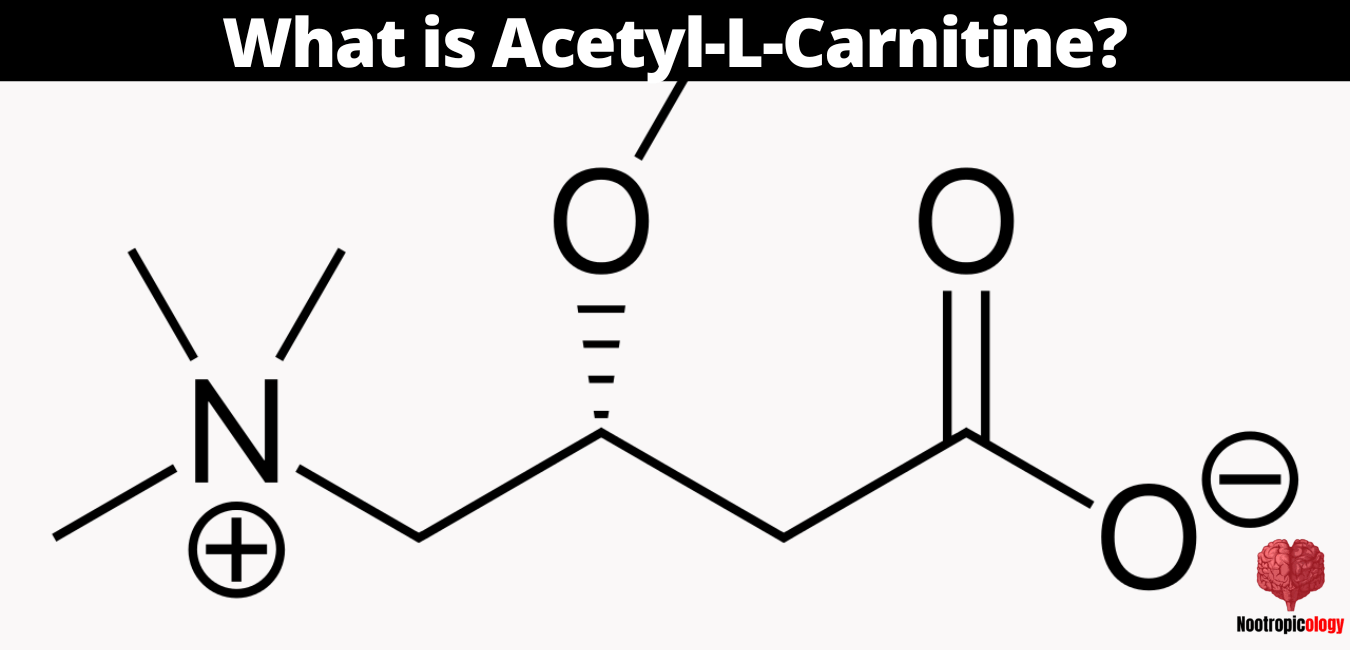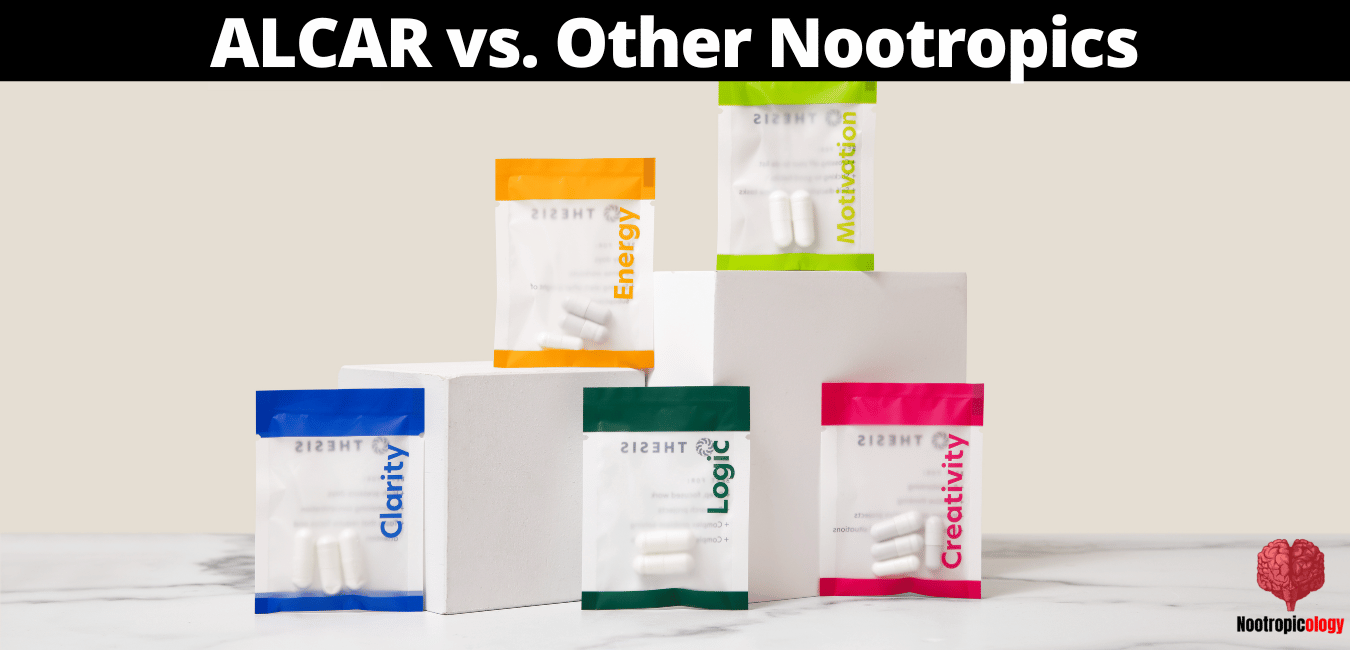Acetyl-L-Carnitine Review: Nootropic Benefits, Side Effects, Dosage & Uses
Embarking on what can only be described as a cognitive odyssey, I have encountered a remarkable nootropic known as Acetyl-L-Carnitine (ALCAR).
Derived from L-carnitine, this compound is key to unlocking enhanced cognitive function. Its benefits span from improved memory and heightened focus to safeguarding against age-related cognitive decline.
Acetyl-L-Carnitine nurtures the brain and effortlessly crosses the blood-brain barrier (BBB), granting it unparalleled access to our cerebral command center. Its potential doesn't end there—this versatile nootropic also supports mood enhancement and mental well-being.
So, as usual, join me on this journey as we dive into the science and explore the benefits, side effects, dosage recommendations, and uses of Acetyl-L-Carnitine as a nootropic.
Overview of Acetyl-L-Carnitine (ALCAR)


Acetyl-L-Carnitine (ALCAR, ALC), a fascinating nootropic, emerges as a compelling subject of exploration. Originating as an acetylated form of L-carnitine, an amino acid derivative abundantly present in the human body, ALCAR showcases distinct neuroprotective qualities that set it apart from its parent compound.
Nootropics, often called "smart drugs" or "cognitive enhancers," aim to optimize brain function, cognition, and mental performance. ALCAR stands out as a notable player within this realm, exhibiting promising effects on cognitive health.
The acetylation process, which involves adding an acetyl group, grants ALCAR unique attributes that distinguish it from L-carnitine. This modification allows ALCAR to effortlessly traverse the blood-brain barrier (BBB), a semipermeable defense mechanism safeguarding the central nervous system (CNS). By successfully crossing this barrier, ALCAR gains unparalleled access to the cerebral command center, where it can unleash its neuroprotective prowess.
ALCAR's neuroprotective properties stem from its ability to support cellular energy production and maintain mitochondrial function within the brain, thus preventing age-associated mitochondrial ultrastructural decay in the hippocampus.[1]
Mitochondria, often referred to as the "powerhouses of the cell," play a crucial role in generating adenosine triphosphate (ATP), the primary energy currency of our bodies. By optimizing ATP synthesis, ALCAR ensures that brain cells have the necessary energy reserves to perform at their peak, promoting overall cognitive function and resilience.[2]
Moreover, ALCAR exhibits potent antioxidant effects, counteracting the damaging effects of oxidative stress on brain cells. Oxidative stress, resulting from an imbalance between harmful free radicals and the body's antioxidant defense system, is implicated in various neurodegenerative conditions. ALCAR's ability to scavenge free radicals and bolster antioxidant defenses contributes to preserving neuronal integrity, potentially slowing down age-related cognitive decline.[3]
Beyond its neuroprotective role, ALCAR modulates neurotransmitter levels and enhances the release of acetylcholine (ACh) release—a neurotransmitter crucial for memory formation and learning. By promoting a healthy balance of neurotransmitters, ALCAR may support optimal cognitive processes, including memory, attention, and information processing.
Acetyl-L-Carnitine's Biochemical Pathways
Acetyl-L-Carnitine (ALCAR) exerts its remarkable effects through intricate biochemical processes within the body. Let's delve into this and explore how this nootropic powerhouse influences our cellular metabolism.
Carnitine, an essential nutrient, is obtained from the diet and synthesized within the body. It is a crucial substrate in various reactions, acting as a carrier for acyl groups. Acetylcarnitine, the most abundant naturally occurring derivative, is synthesized through a reaction involving acetyl-CoA and carnitine. In this reaction, the acetyl group displaces a hydrogen atom in the central hydroxyl group of carnitine, forming acetylcarnitine and CoA.
Coenzyme A (CoA), a vital player in the mitochondria's Krebs cycle, is essential for the production of ATP. Acetyl-CoA, which is primarily derived from glucose metabolism, serves as the primary substrate for the Krebs cycle. Once acetyl-CoA is de-acetylated, it must be recharged with an acetyl group to sustain the Krebs cycle's functionality.[4]
Interestingly, most cell types possess transporters that facilitate the import of carnitine and the export of acyl-carnitines. This mechanism appears to help eliminate longer-chain moieties. However, numerous cell types can also import ALCAR, emphasizing its unique role.
Within cells, carnitine plays a vital role in importing acyl-CoA into the mitochondria. The acyl group of acyl-CoA is transferred to carnitine, forming acyl-carnitine. This acyl-carnitine is then imported through both mitochondrial membranes before being transferred back to CoA.
The CoA molecule is subsequently beta-oxidized to produce acetyl-CoA, which sustains the Krebs cycle's energy-generating processes. Another set of enzymes and transporters functions to maintain a balance by eliminating excess acetyl-CoA from inside the mitochondria.
Carnitine accepts the excess acetyl moiety, becoming ALCAR. ALCAR is then transported out of the mitochondria and into the cytosol, ensuring free CoA is available to import fatty acid chains.
ALCAR in the cytosol can form a pool of acetyl groups for CoA when the cell requires it. This adaptive mechanism enables the cell to utilize carbohydrates for energy production at the expense of fatty acids when there is an excess of acetyl-CoA.
Thus, Acetyl-L-Carnitine plays a crucial role in various biochemical pathways. It facilitates the transport of acyl groups, aids in the proper functioning of the Krebs cycle, and helps regulate the balance between different energy sources.
By modulating acetyl-CoA levels, ALCAR influences the utilization of carbohydrates and fatty acids for energy production. Understanding the intricate mechanisms of Acetyl-L-Carnitine's action provides insights into its potential cognitive and metabolic benefits.
Acetyl-L-Carnitine's Mechanism of Action


Now that we know the basics, we can dive a bit deeper into the science of Acetyl-L-Carnitine's action to see how it works its magic in the brain as a cognitive enhancer and in the body as a metabolic booster.
Acetyl-L-Carnitine (ALCAR) exhibits its multifaceted effects through a complex array of metabolic and neurobiological mechanisms. Research suggests that ALCAR's primary role is to donate an acetyl group during fatty acid metabolism, aiding in the transportation of fatty acids, including acetyl CoA, into the mitochondrial matrix where fatty acid metabolism takes place.[5]
This metabolic function contributes to ALCAR's ability to enhance energy production and optimize mitochondrial function. In addition to its metabolic role, ALCAR has been found to possess neuromodulatory, neurotrophic, and neuroprotective effects. These neurobiological properties are thought to play a significant role in their positive effects on various neurological diseases.
Studies have also indicated that ALCAR has antioxidant properties. Through its interaction with the tyrosine kinase A receptor, ALCAR has been shown to decrease the production of free radicals, peroxidation of lipids, and oxidation of proteins. It can also impact cellular antioxidant systems by decreasing glutathione levels and increasing thioredoxin.[6]
Chemical Structure and Bioavailability of Acetyl-L-Carnitine (ALCAR)
Acetyl-L-Carnitine (ALCAR) is characterized by adding an acetyl group to the nitrogen atom. Its chemical formula is C9H17NO4, and it is categorized as a quaternary ammonium compound. ALCAR's chemical structure, specifically the acetyl moiety, is responsible for its unique biological properties and distinguishes it from its parent compound, L-carnitine.
The bioavailability of Acetyl-L-Carnitine (ALCAR) is estimated to be greater than 10%, implying that more than 10% of the ingested ALCAR is absorbed into the systemic circulation and becomes available at the site of action. This relatively high bioavailability is attributed to its efficient absorption from the gastrointestinal tract through active transport involving the organic cation/carnitine transporter (OCTN2).[7]
Once absorbed into the bloodstream, the acetyl moiety of ALCAR facilitates its ability to cross the blood-brain barrier, which is an essential step for it to exert its effects on the central nervous system. Moreover, ALCAR is not extensively metabolized in the liver, a process that often significantly reduces the bioavailability of many drugs and nootropic supplements.
This bypass of first-pass metabolism, coupled with its ability to cross the blood-brain barrier, contributes to ALCAR's high bioavailability and effectiveness as a nootropic.
Acetyl-L-Carnitine's Role in Acetylcholine (ACh) Synthesis
Acetyl-L-Carnitine (ALC) is crucial in synthesizing Acetylcholine (ACh). According to the study by White and Scates,[8] ALC can act as a precursor for ACh synthesis. The research showed that the synthesis of [3H]acetylcholine from [3H]acetyl-L-carnitine could be achieved in vitro by coupling two critical enzyme systems: choline acetyltransferase and carnitine acetyltransferase.
Furthermore, both [3H] and [14C] labeled acetylcholine were produced when [3H]acetyl-L-carnitine and D-[U-14C] glucose were incubated with synaptosomal membrane preparations from rat brains.
This transfer of the acetyl moiety from acetyl-L-carnitine to acetylcholine was found to be dependent on the concentration of ALC. Also, it required the presence of coenzyme A, which is usually produced as an inhibitory product of choline acetyltransferase.
This study thereby provided further evidence supporting the role of mitochondrial carnitine acetyltransferase in facilitating the transfer of acetyl groups across mitochondrial membranes. This process is critical as it regulates the availability of acetyl-CoA, a substrate of choline acetyltransferase, in the cytoplasm.
The results also indicate the potential therapeutic benefits of ALC in addressing age-related cholinergic deficits, emphasizing its significant role in ACh synthesis.
Neuroprotective and Cognitive Enhancing Benefits of Acetyl-L-Carnitine
Acetyl-L-Carnitine (ALCAR) plays a substantial role in maintaining neuronal health and promoting neurogenesis - the process of creating new neurons within the brain. Firstly, ALCAR is an essential component of fatty acid metabolism, as it transports long-chain fatty acids into the mitochondria for beta-oxidation, thereby facilitating energy production.
This energy is critical for the functioning and survival of neurons.
Secondly, ALCAR possesses antioxidant properties, helping to neutralize harmful free radicals and reduce oxidative stress in neurons. It also enhances the activity of antioxidant enzymes and promotes the synthesis of glutathione, one of the body's most potent antioxidants.
Additionally, ALCAR can modulate levels of neurotrophic factors, proteins that promote the survival and differentiation of neurons. For instance, it has been shown to upregulate the expression of nerve growth factor (NGF), thereby supporting neuronal health and neurogenesis.[9]
That said, here are some key cognitive enhancements associated with Acetyl-L-Carnitine:
- Improved Memory: ALCAR has been shown in several studies to enhance memory in terms of recall and retention. It is believed to do this by increasing acetylcholine levels in the brain, a neurotransmitter that is crucial for memory formation and consolidation.[10]
- Enhanced Learning: Alongside memory, ALCAR also boosts learning capabilities. This is largely attributed to its role in acetylcholine synthesis and its ability to enhance synaptic transmission, both critical for learning processes.[11]
- Better Attention and Concentration: ALCAR has been associated with improved attention span and concentration. Through its role in mitochondrial function, its energizing effect on brain cells contributes to this benefit.
- Neuroprotection and Aging: ALCAR provides neuroprotective benefits that help slow the cognitive decline associated with aging and neurodegenerative diseases. It does this through various mechanisms, including its antioxidant properties, role in energy production, and ability to stimulate neurotrophic factors' release.
- Mood Enhancement: Some research has indicated that ALCAR can have a positive effect on mood and may be beneficial in conditions like depression and anxiety. This may be due to its influence on neurotransmitter systems, including acetylcholine and dopamine.[12]
Comparative Analysis: Acetyl-L-Carnitine vs Other Nootropics


Acetyl-L-Carnitine (ALCAR), Alpha-GPC, and CDP-Choline are all well-known nootropics and precursors to acetylcholine, a neurotransmitter vital for cognitive functions. While they share similarities, their distinct characteristics and functions set them apart.
- Alpha-GPC is a choline-containing supplement that is rapidly absorbed and crosses the blood-brain barrier. Once in the brain, it supports the synthesis of acetylcholine and the release of the neurotransmitter dopamine, which may improve memory, thinking skills, and learning. However, it's worth noting that Alpha-GPC's primary function is providing choline to the brain and doesn't offer much beyond its acetylcholine-boosting properties.
- CDP-Choline (Citicoline), on the other hand, has a broader range of benefits. Besides providing choline for acetylcholine synthesis, it also contributes to the synthesis of phosphatidylcholine, a critical component of neuronal cell membranes. This dual action supports both brain energy metabolism and cellular maintenance. Furthermore, CDP-Choline has been studied for its potential to help with cognitive impairment and neurodegenerative diseases.
- ALCAR stands out due to its additional neuroprotective and metabolic roles. As an acetylcholine precursor, it supports cognitive functions similar to Alpha-GPC and CDP-Choline. However, it also exhibits antioxidant properties, which can protect neurons from damage caused by harmful free radicals. In addition, ALCAR plays a crucial role in cellular energy metabolism by facilitating the transport of fatty acids into the mitochondria for energy production. This attribute makes ALCAR particularly beneficial in conditions with an energy deficit or age-related cognitive decline.
Therefore, while all three compounds are effective acetylcholine precursors, ALCAR might offer more comprehensive benefits, particularly for neuroprotection and energy metabolism.
Comparative Efficacy with Other Nootropics: Modafinil, Piracetam, and Aniracetam
Acetyl-L-Carnitine (ALCAR) shares a common goal with Modafinil, Piracetam, and Aniracetam - that is, to enhance cognition - it does so through distinct pathways, offering unique benefits:
- Modafinil is a wakefulness-promoting agent and is often used off-label for cognitive enhancement. It works by increasing the availability of certain neurotransmitters like dopamine, norepinephrine, and histamine, thereby improving alertness, attention, and vigilance. Modafinil doesn't directly boost acetylcholine like ALCAR but can enhance cognitive performance, particularly in sleep-deprived individuals or those with narcolepsy. It's also worth noting that Modafinil may come with potential side effects, such as headache, anxiety, and sleep disturbances.
- Piracetam is considered the first racetam and is known for its cognitive-enhancing properties. It operates mainly by modulating the function of glutamate receptors, enhancing neuronal membrane fluidity, and promoting cerebral circulation. While Piracetam doesn't directly increase acetylcholine levels like ALCAR, it enhances the brain's utilization of this neurotransmitter, which can lead to improved memory and cognition. Piracetam is generally well-tolerated, but it's often recommended to be taken with a choline source to avoid potential headaches.
- Aniracetam is another racetam family member known for its anxiolytic effects alongside cognitive enhancement. It has a mechanism of action similar to Piracetam but is also thought to modulate the release of dopamine and serotonin. Aniracetam doesn't act directly as an acetylcholine precursor like ALCAR, but it can enhance this neurotransmitter's release and receptor efficiency. Aniracetam is fat-soluble, unlike the other two racetams, and therefore needs to be taken with meals for optimal absorption.
As I mentioned before, ALCAR, in comparison, functions as an acetylcholine precursor, supports energy metabolism and exhibits neuroprotective properties.
Its unique mechanism of action helps protect the brain from oxidative stress and supports neuronal energy production, making it beneficial for age-related cognitive decline and neurodegenerative conditions.
Synergistic Potential with Other Nootropics: Stacking Considerations
Nootropic stacking, the practice of combining multiple cognitive-enhancing substances, can offer a way to maximize cognitive benefits and target specific cognitive domains.
Regarding ALCAR, its unique mechanism of action and safety profile makes it a viable candidate for stacking with other nootropics. However, it's crucial to consider the synergistic potential and interaction risks when designing a nootropic stack.
ALCAR and Choline Sources (Alpha-GPC, CDP-Choline)
Given ALCAR's role as an acetylcholine precursor, it can potentially work well with other cholinergic nootropics like Alpha-GPC or CDP-Choline. While ALCAR provides the acetyl group, Alpha-GPC and CDP-Choline supply choline to synthesize acetylcholine, thereby enhancing cognitive function.
The combined use might help to maximize acetylcholine levels and related cognitive benefits.
ALCAR and Racetams (Piracetam, Aniracetam)
Racetams are known to enhance the utilization of acetylcholine in the brain. Stacking ALCAR with racetams can be a strategic move as ALCAR could ensure a consistent supply of acetylcholine. In contrast, racetams can improve the efficiency of these neurotransmitters, potentially resulting in enhanced cognition.
ALCAR and Modafinil
Modafinil is known for promoting alertness and vigilance. Combining it with ALCAR could potentially result in more comprehensive cognitive enhancement. ALCAR could complement Modafinil's effects by supporting brain energy metabolism and neuronal health.
Despite these potential synergies, it's important to remember that everyone's neurochemistry is unique, and the effects of nootropics can vary greatly among individuals.
Therefore, it's crucial to start with low doses when trying a new stack and gradually increase as necessary. It's always best to consult a healthcare provider before starting any new supplementation regimen, especially when combining multiple substances.
It's also essential to monitor oneself for any adverse effects and discontinue use if they occur.
Safety, Tolerability, Side Effects, and Dosage Guidelines for ALCAR


Acetyl-L-Carnitine (ALCAR) is generally considered safe and well-tolerated in healthy adults. However, like all supplements, it should be used responsibly to ensure safety and efficacy.
Safety, Adverse Effects, and Tolerability: ALCAR has been used in numerous clinical trials, and its safety profile is well-established. Most users do not report any adverse effects. However, in some cases, individuals have reported minor side effects such as nausea, stomach discomfort, diarrhea, or restlessness.
These side effects are often dose-dependent and may decrease over time as the body adjusts to the supplement. Rarely, some people may have an allergic reaction to ALCAR, which may cause symptoms such as rashes, itching, or swelling. If such symptoms occur, it's crucial to discontinue use and consult a healthcare professional.
Dosage Guidelines: The appropriate dosage of ALCAR can vary based on factors such as age, overall health, and specific health goals. As a dietary supplement for cognitive support, the recommended dosage ranges from 500 to 2000 mg daily, usually divided into two or three doses. Some research studies have used higher doses for specific conditions, but high doses should only be taken under the supervision of a healthcare provider.
For optimal absorption, ALCAR can be taken with or without food. If gastrointestinal upset occurs, taking the supplement with a meal may help alleviate symptoms.
It's important to start with the lower end of the dosage range when first beginning supplementation with ALCAR and then gradually increase the dose as tolerated. This allows the body to adjust to the supplement and helps identify a dosage that provides the desired benefits without causing adverse effects.
Interactions: ALCAR may interact with certain medications, including anticoagulants and antiplatelet drugs. If you're taking any medications or have a medical condition, it's essential to consult a healthcare provider before starting ALCAR.
While ALCAR is a naturally occurring substance in the body and is generally considered safe, it's crucial to remember that more isn't always better.
Frequently Asked Questions (FAQ)
Where Can I Buy ALCAR Online?
ALCAR is available in many health food stores, online retailers, and through nootropic suppliers. It's important to purchase the supplement from a reputable source to ensure its quality and potency. I recommend purchasing Acetyl L-Carnitine HCl (ALCAR) here.
What Is the Half-Life of Acetyl-L-Carnitine?
The half-life of Acetyl-L-Carnitine (ALC) is approximately 35.9 hours. This means it takes about 35.9 hours for the concentration of Acetyl-L-Carnitine in the body to decrease by half.
How Does ALCAR Compare to L-Carnitine?
ALCAR is more bioavailable and can cross the blood-brain barrier, while L-carnitine cannot. This makes ALCAR a better choice for improving mental performance, while L-carnitine is better suited for improving athletic performance and fat burning.
How Does ALCAR Make You Feel?
ALCAR improves overall cognitive function, including focus and attention. Users report feeling more alert and motivated, with improved mental clarity. ALCAR also improves mood and increases energy levels.
Does Acetyl-L-Carnitine Keep You Up at Night?
Acetyl-L-Carnitine (ALCAR) is not typically associated with sleep disturbances and it's not a stimulant like caffeine. However, individual responses can vary. A few people may experience increased alertness or energy levels after taking ALCAR, which could interfere with sleep if taken late in the day. If you find that ALCAR affects your sleep, consider taking it earlier in the day.
Do I Need to Cycle Acetyl-L-Carnitine?
There is no standard recommendation for cycling Acetyl-L-Carnitine (ALCAR). It is generally considered safe for long-term use at recommended dosages. If you are concerned about tolerance buildup, you could cycle ALCAR like any other nootropic supplement.
How Fast Does Acetyl-L-Carnitine Work?
The effects of Acetyl-L-Carnitine (ALCAR) are generally noticeable within 1 to 3 hours after ingestion due to its rapid absorption and metabolism. However, consistent use over several weeks (typically 2-4 weeks) may be required for long-term cognitive enhancement or neuroprotective effects before substantial improvements are observed.
Conclusion
Acetyl-L-Carnitine (ALCAR) is an impressive nootropic due to its unique role as an acetylcholine precursor, energy metabolism support, and neuroprotective attributes.
Research suggests that ALCAR has a direct role in synthesizing acetylcholine, a crucial neurotransmitter for cognitive functions. Additionally, ALCAR exhibits antioxidant properties, providing a layer of neuroprotection against oxidative stress.
Its role in transporting fatty acids into the mitochondria for energy production also contributes to neuronal health and functioning. These attributes set ALCAR apart from other nootropics and acetylcholine precursors like Alpha-GPC and CDP-Choline.
When compared to other cognitive enhancers such as Modafinil, Piracetam, and Aniracetam, ALCAR's additional benefits in energy metabolism and neuroprotection make it a standout candidate.
Its diverse benefits make it a versatile tool for cognitive enhancement and neuroprotection. It serves as a potent cognitive enhancer and crucial support to brain health and energy production. This makes it particularly beneficial for those dealing with age-related cognitive decline or neurodegenerative conditions.
Furthermore, ALCAR's synergistic potential, when combined with other nootropics, opens up opportunities for tailored cognitive enhancement strategies, making it an ideal component of nootropic stacks.
In summary, ALCAR's role in cognitive enhancement and neuroprotection is well-founded and diverse, making it an appealing choice for those seeking to support brain health and cognitive function.
- Aliev, Gjumrakch et al. “Neuronal mitochondrial amelioration by feeding acetyl-L-carnitine and lipoic acid to aged rats.” Journal of cellular and molecular medicine vol. 13,2 (2009): 320-33. doi:10.1111/j.1582-4934.2008.00324.x ↑
- Dhitavat, Sirakarnt et al. “Acetyl-L-carnitine protects against amyloid-beta neurotoxicity: roles of oxidative buffering and ATP levels.” Neurochemical research vol. 27,6 (2002): 501-5. doi:10.1023/a:1019800703683 ↑
- Singh, Sonu et al. “ALCAR Exerts Neuroprotective and Pro-Neurogenic Effects by Inhibition of Glial Activation and Oxidative Stress via Activation of the Wnt/β-Catenin Signaling in Parkinsonian Rats.” Molecular neurobiology vol. 53,7 (2016): 4286-301. doi:10.1007/s12035-015-9361-5 ↑
- Verschueren, Koen H G et al. “Structure of ATP citrate lyase and the origin of citrate synthase in the Krebs cycle.” Nature vol. 568,7753 (2019): 571-575. doi:10.1038/s41586-019-1095-5 ↑
- Nie, L.-J., Liang, J., Shan, F., Wang, B.-S., Mu, Y.-Y., Zhou, X.-H., & Xia, Q.-R. (2021, September 2). "L-carnitine and acetyl-l-carnitine: Potential novel biomarkers for major depressive disorder." Frontiers. https://www.frontiersin.org/articles/10.3389/fpsyt.2021.671151/full ↑
- Abdul, Hafiz Mohmmad, and D Allan Butterfield. “Involvement of PI3K/PKG/ERK1/2 signaling pathways in cortical neurons to trigger protection by cotreatment of acetyl-L-carnitine and alpha-lipoic acid against HNE-mediated oxidative stress and neurotoxicity: implications for Alzheimer's disease.” Free radical biology & medicine vol. 42,3 (2007): 371-84. doi:10.1016/j.freeradbiomed.2006.11.006 ↑
- Juraszek, Barbara, and Katarzyna A Nałęcz. “SLC22A5 (OCTN2) Carnitine Transporter-Indispensable for Cell Metabolism, a Jekyll and Hyde of Human Cancer.” Molecules (Basel, Switzerland) vol. 25,1 14. 19 Dec. 2019, doi:10.3390/molecules25010014 ↑
- White, H L, and P W Scates. “Acetyl-L-carnitine as a precursor of acetylcholine.” Neurochemical research vol. 15,6 (1990): 597-601. doi:10.1007/BF00973749 ↑
- Taglialatela, G et al. “Acetyl-L-carnitine treatment increases nerve growth factor levels and choline acetyltransferase activity in the central nervous system of aged rats.” Experimental gerontology vol. 29,1 (1994): 55-66. doi:10.1016/0531-5565(94)90062-0 ↑
- De Simone, R et al. “Effect of acetyl-L-carnitine on forebrain cholinergic neurons of developing rats.” International journal of developmental neuroscience : the official journal of the International Society for Developmental Neuroscience vol. 9,1 (1991): 39-46. doi:10.1016/0736-5748(91)90071-s ↑
- Ando, S et al. “Enhancement of learning capacity and cholinergic synaptic function by carnitine in aging rats.” Journal of neuroscience research vol. 66,2 (2001): 266-71. doi:10.1002/jnr.1220 ↑
- Nie, Li-Juan et al. “L-Carnitine and Acetyl-L-Carnitine: Potential Novel Biomarkers for Major Depressive Disorder.” Frontiers in psychiatry vol. 12 671151. 30 Sep. 2021, doi:10.3389/fpsyt.2021.671151 ↑
